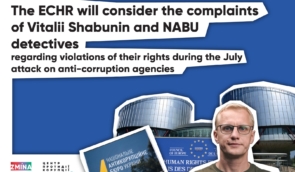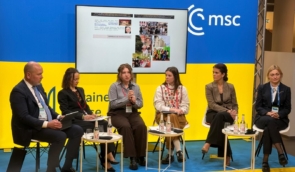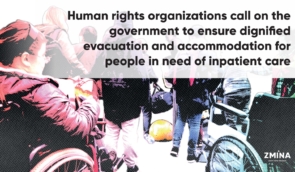“I want to go to my people”: human rights defenders have published a number of concerns about the project
Human rights organisations call for compliance with international law in the search for tools to release civilians illegally detained in Russia and the temporarily occupied territories of Ukraine, and to stop broad information campaigns aimed at finding “traitors” among its citizens.
On July 25, 2024, the Office of the Ukrainian Parliament Commissioner for Human Rights, together with the Coordination Headquarters for the Treatment of Prisoners of War and the Security Service of Ukraine, presented a joint project “Хочу к своим” (“I want to go to my people”), which is positioned as a mechanism for the return of civilian Ukrainians from Russian captivity.
The core idea of the project is that a separate website, “I want to go to my people”, publishes information about people prosecuted mainly for crimes against the foundations of Ukraine’s national security committed during the war (in particular, treason, collaboration, dissemination of information about the location and movement of the Armed Forces, etc.) In addition to a photo of the convicted person and brief information about the circumstances of the offence, the website publishes a “consent to exchange”, i.e. a request for the person to be transferred to the territory of the RF or the temporarily occupied territory of Ukraine as a prisoner of war “for exchange for a Ukrainian citizen held captive by the RF”.
Three types of applications can also be submitted through a special form on the website: “Do you want to stop cooperating with the enemy?”, “Do you know someone collaborating with the enemy?” and “Do you want to return to Russia?”. According to the Ukrainian Parliament Commissioner for Human Rights, the return of persons will be subject to prior approval through a communication channel between the Commissioner and the Ombudsman of the RF.
We, the representatives of human rights organisations, consent to an urgent need to find ways to return Ukrainian civilians illegally deprived of their liberty as a result of the armed aggression of the RF against Ukraine. The abduction of Ukrainian civilians is a war crime committed by the RF, which is systemic and widespread. At least 1,770 such incidents have been documented so far, and this number is growing due to the ongoing occupation of part of Ukraine’s territory.
However, the methods and ways of returning civilians matter, as Ukraine is a democratic state governed by the rule of law, on the path to EU integration, it must ensure respect for human rights and freedoms even during wartime.
In fact, by initiating the project “I want to go to my people”, Ukraine for the first time since the beginning of the large-scale invasion by Russia announced its intention to conduct an “exchange” of civilians with the Russian side. This practice is contrary to international humanitarian law (IHL), as the Ukrainian side has repeatedly emphasised. The release of Ukrainian civilians illegally deprived of their liberty as a result of Russia’s armed aggression must be unconditional. However, based on the presentation, Ukraine intends to conduct an exchange of civilians, handing over Ukrainian citizens to Russia or the territories occupied by Russia. Leaving aside the question of the ethics of exchanging “wrong Ukrainians” for the “right Ukrainians”, the promotion of such an exchange is unlikely to lead to the creation of a sustainable mechanism for the return of civilians from illegal detention in the RF, which has been much discussed in recent years. Instead, the practice of exchanging civilians could create significant problems and complications for Ukraine.
First, in the future, such an initiative will lead to an increase in human rights violations in the occupied territories. In particular, it may be perceived as the legitimisation of illegal trials against Ukrainian civilians held by the RF. It could also lead to an increase in the practice of illegal detention of civilians and an increase in cases of detention for the purpose of using them as an “exchange fund”.
Second, the widespread practice of exchanges in relation to this category of persons and the use of prisoner-of-war guarantees concerning them may lead to a reduction in their protection under international humanitarian law. By exchanging its civilians for its own, Ukraine legitimises the criminal policy of the RF regarding the “exchanges” of civilians and shifts the legal regime for the protection of their rights provided under IHL (which applies between two belligerent states and categorically prohibits the capture of civilians) to the one of non-international armed conflict, where engagement is artificially created solely between Ukrainian citizens. Ukraine is thus arbitrarily refusing to use legal guarantees for its citizens that exist during an international armed conflict.
Third, the exchange of Ukrainian civilians convicted, in particular, of crimes against national security may encourage the law enforcement and judicial system of Ukraine to commit violations, superficial investigations and review of relevant cases. The accused persons may be pressured or otherwise forced at the pre-trial stage to plead guilty and enter into a plea bargain in exchange for potential future extradition to the RF. All of this together may constitute a violation of the right to a fair trial and may in the future be the subject of proceedings in both the European Court of Human Rights and the International Criminal Court. At the same time, among the persons currently “offered” for exchange, the website lists those who have committed severe and particularly serious crimes. The release of such persons from serving their sentences may result in an increase in impunity for crimes committed in the context of armed aggression against Ukraine.
Fourth, it is difficult to verify the voluntariness of the convict’s consent to the “exchange”, as such consent is given in conditions of detention. This may be considered a refoulement of such a person because of their political beliefs, which is a likely violation of the principle of non-refoulement. It is a fundamental principle of customary international law and is enshrined in many conventions, including the 1984 UN Convention against Torture and Other Cruel, Inhuman or Degrading Treatment or Punishment.
Fifth, the effectiveness of the proposed method of returning civilians in practice is highly questionable. As noted on the official Facebook page of the project itself, there is no interest in conducting such “exchanges” on the part of the Russian side. Therefore, the exchange of persons convicted of crimes, in particular, against the foundations of national security, may never take place, while their release due to the completion of their sentence may occur. For them, personally written statements (with the address of residence and other personal data) about their readiness to go to Russia or the temporarily occupied territory of Ukraine will be a factor of additional stigmatisation and may create a real threat of persecution and revenge on the territory controlled by the government of Ukraine.
Sixth, the disclosure of so much personal data is not justified, and the popularisation of the site among Ukrainian citizens negatively affects the general perception of Ukraine and Ukrainians who are fighting for their independence and sovereignty. It seems that the authors of the project are deliberately trying to exaggerate the real state of affairs, where some Ukrainian citizens are opposed to other citizens. This perception is formed by the opportunity to submit personal data about both alleged offenders and the desire to become an “exchange fund” for relocation to Russia.
Seventh, it creates the possibility of avoiding mobilisation in Ukraine through the instrument of consent to travel to the RF, which the Russian Federation can use to guarantee that men of military age will not be conscripted.
We believe that the illegal detention of Ukrainian civilians by Russia is a gross violation of international law, and given the systematic and widespread nature of this practice, it may ultimately be qualified as a crime against humanity. At the same time, the initiative of the representatives of the Ukrainian state to form an “exchange fund” from the number of civilian Ukrainian citizens does not comply with IHL and is a demonstration of the inconsistency of Ukraine’s state position.
Human rights organisations call on state authorities to communicate more carefully the issue of the release of Ukrainian civilians illegally deprived of their liberty by the RF. The work on the release of this category of persons is the subject of thorough work by both Ukraine and its partner countries, in which it is necessary to comply with international law.
The project “I want to go to my people” poses a threat to the state’s information security and undermines Ukraine’s commitment to respect human rights in the eyes of partner countries, and therefore it is recommended at least to:
- block access to the website for a wide range of users https://hochuksvoim.com/en;
- continue to seek ways to return civilians illegally detained in the RF — ways that should not lead to the disregard of legal guarantees enshrined in international humanitarian law for Ukrainian citizens;
- intensify the work of the International Platform for the Release of Civilians Illegally Detained by the Russian Federation;
- ensure fair and high-quality review of cases of crimes against national security and, given the scale of such crimes, promote the creation of mechanisms for proper response and prevention of such crimes.
Signed by:
Human Rights Centre ZMINA
Institute for Peace and Common Ground
Ukrainian Legal Advisory Group
Media Initiative for Human Rights
NGO “Crimean Process”
Charity Foundation “Stabilization Support Services”
NGO “Donbas SOS”
Ukrainian Helsinki Human Rights Union
Kharkiv Institute for Social Research
Truth Hounds
Civil Holding Group of Influence
Kharkiv Anti-Corruption Centre
If you have found a spelling error, please, notify us by selecting that text and pressing Ctrl+Enter.















